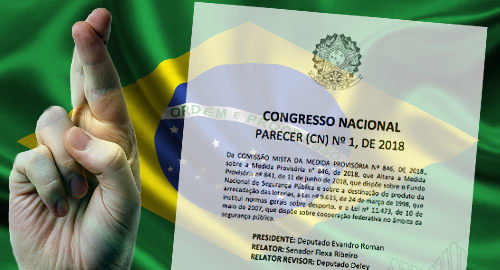 Brazil’s gamblers are anxiously watching the progress of a piece of lottery reform legislation that could legalize online and land-based sports betting.
Brazil’s gamblers are anxiously watching the progress of a piece of lottery reform legislation that could legalize online and land-based sports betting.
On Wednesday, a joint committee of Brazil’s bicameral legislature approved an amended version of Provisional Measure (PM) 846/2018 (in Portuguese, with betting talk in Chapter V), which details how lottery revenue will be split among public security, cultural and social programs.
The bill would also authorize the Ministry of Finance to oversee both land-based and online fixed-odds sports betting within “a competitive environment.” Assuming legislators approve the measure, the Ministry would have two years in which to license and regulate wagering activity.
The bill’s text requires land-based betting operators to pay out at least 82% of their wagering handle in winnings to bettors and taxes on those winnings, plus a further 4% to a group comprising sports bodies, social security, schools and Brazil’s National Public Security Force. Operators’ expenses can’t top 14% of handle.
Online bookies would face a 90% payout minimum in winnings and taxes, a 2% payment to the same groups cited above and an 8% cap on operating expenses.
The bill will now be debated in the Chamber of Deputies before proceeding to the Senate. As a provisional measure, 846/2018 must be approved by both legislative chambers by November 28 if it is to become law of the land.
Brazil appeared to have squandered its chance to approve gambling expansion this summer, when the president of the Chamber of Deputies suggested that there would be no further talk of gambling until 2019. A Chamber committee approved a gambling bill but it never came up for a vote by the full body, while a Senate committee voted thumbs-down on that body’s gambling bill this spring.
With over 210m inhabitants, Brazil is the largest country in South America and the region’s great white whale in the eyes of international gambling operators, be they online or land-based. Las Vegas Sands owner Sheldon Adelson in particular has been doing the hard-sell on Brazilian authorities for years now in the hopes of opening a major integrated resort in a major city.